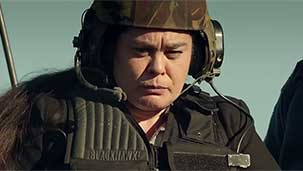Some jobs sound almost too good to be true.
Shooting a film in New Zealand certainly presents some visual opportunities, and Hunt for the Wilderpeople makes the most of its varied natural landscape. Rain forests, tundra, mountains, rolling plains, and rock strewn plateaus that look more Martian than Terrestrial are the backdrop for an intimate, and often funny, look at how family is sometimes a choice rather than a birthright.
This is a film that is in love with its landscape. The aerial shots in particular are breathtaking in their beauty and sense of scale. They convey a world that feels half finished, raw and unadulterated by the petty concerns of the few people that manage to eke out an existence in its fringes. And plunked down in this prehistoric landscape is a young orphan named Ricky Baker--oddly bedecked in his New Zealand tinted idea of OG wear, and so blatantly out of his element that the contrast feels not just comical but uncomfortable -- like watching a person wearing a speedo walk into an Opera House.
Ricky has come to live with a new foster family: an earth mother type (a far too brief but touching performance by Rema Te Waita), a dog named Zag and an unrepentant misanthrope, played deftly by Sam Neill. After a tragedy that reminds everyone that this isn’t a Disney film, Ricky and Uncle Hec (as well as the two dogs, Zag and Ricky’s birthday present, Tupac) find themselves at the center of a national manhunt. But the plot is a paper-thin contrivance that gives the film’s real purpose some breathing room.
Many of the themes that underpin Hunt for the Wilderpeople--the contrast between urban and pastoral living, characters who would all make good candidates for The Island of Misfit Toys, the pull of disappearing off the map, and what family really means--are so front and center in my own life that it’s hard to disentangle my own concerns from my critical obligations. It doesn’t make it any easier when everyone in this film is so goddamn charming. Sam Neill is delightful as is Julian Dennison’s Ricky. The rest of the film is populated by memorable and often ludicrous individuals (including Rhys Darby, who plays a conspiracy nut/survivalist that is actually fun to be around).
The evolution of Hec’s and Ricky’s relationship is what makes this film special. Despite its often absurdist tone, there is an authenticity and emotional power to their problematic journey (a path that is both literal and metaphorical) that plays out in the wilds of New Zealand. I found that journey to be deeply affecting both as a story and because it resonated so much with my own recent personal experience. When you can recognize real moments in your own life reflected up on the screen, especially when portrayed with such nuance and accuracy, it certainly makes a film resonate.
Part of the Hunt for the Wilderpeople’s success is how it deals with subject matter that could easily turn maudlin, and how quietly and organically Hec and Ricky’s relationship grows. Not to mention the natural affability of the actors involved. You really come to like these people as you witness their growing awareness of their vulnerability and transience. Ricky and Hec need each other to survive and flourish.
I admit to envying you, as you fly a couple of hundred feet over landscape that is so beautiful that it feels almost contrived. That beauty combines with the innate humanity of the characters to create the unique cinematic experience that is Hunt for The Wilderpeople.
Sincerely,

Tim








